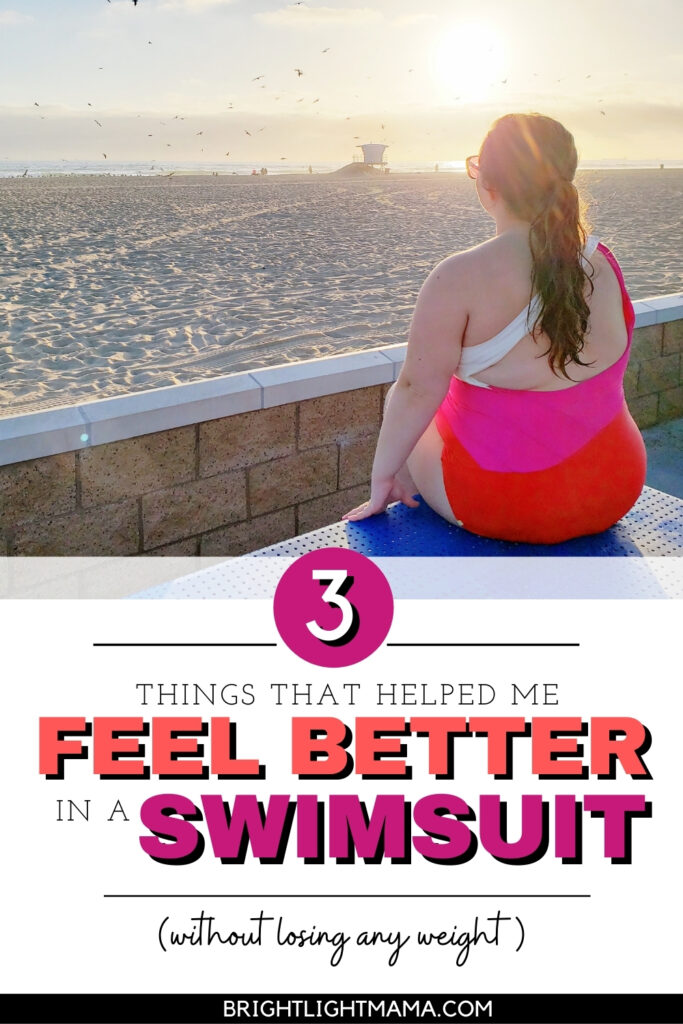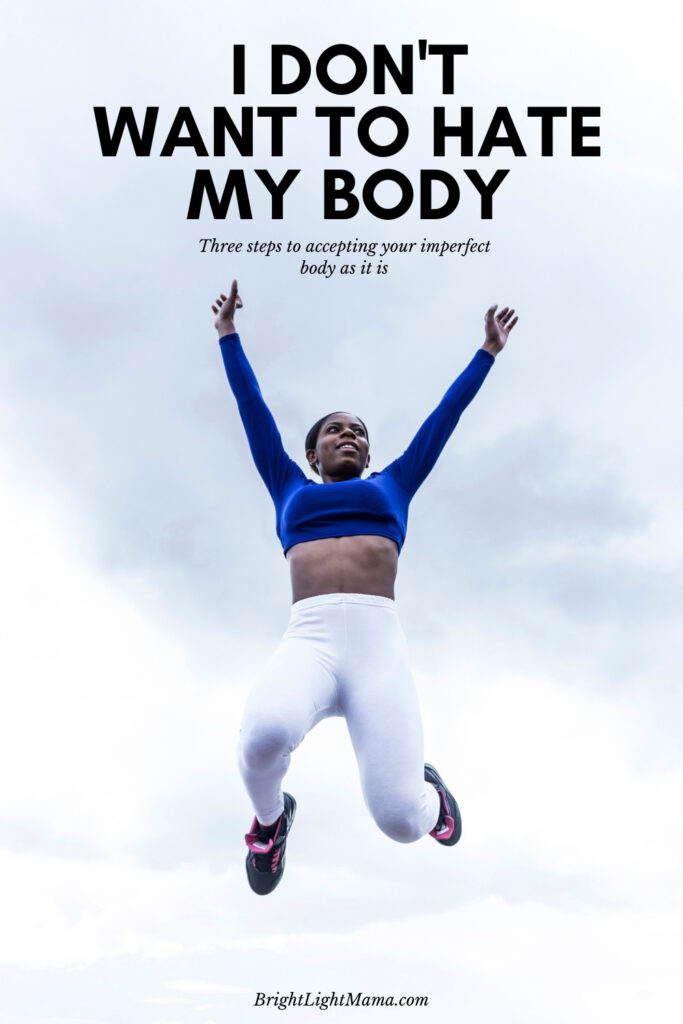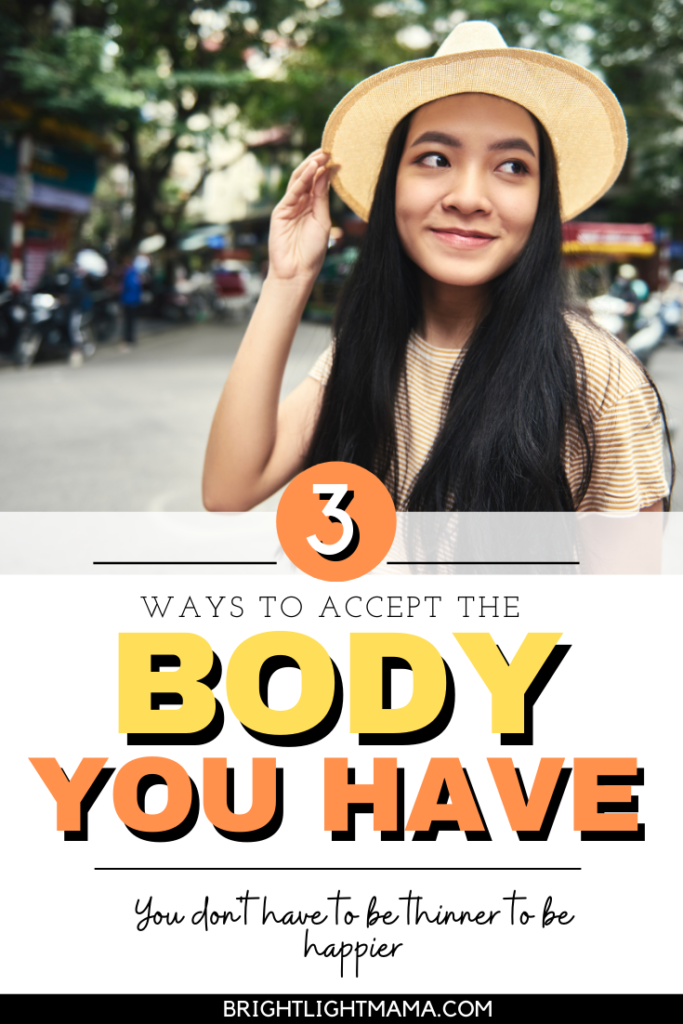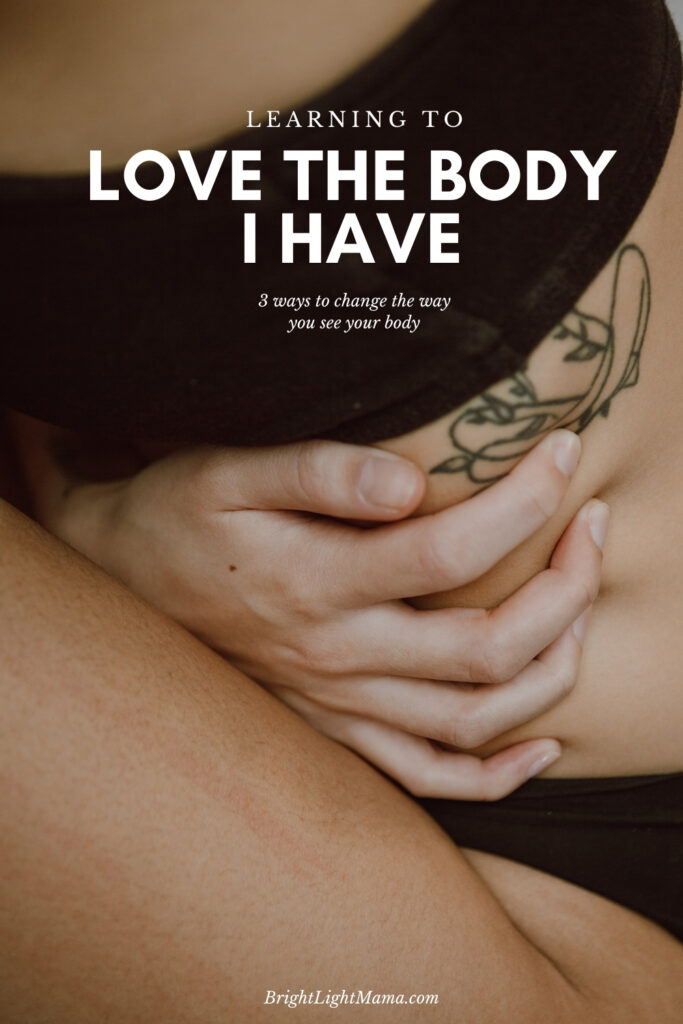
“I hate my body.”
How many times have I thought this, staring into the mirror half-dressed, critiquing it’s shape and size, lumps and bumps?
I scan it up and down, measuring it’s value, it’s worthiness, by how it looks:
My skin’s color and texture–over-plump brown moles, shiny zigzag stretch marks, polkadots of acne. Hairs that grow where I don’t want them to. Split ends. Belly fat and back rolls. Cracked cuticles and dry skin.
There are so many things to look at, and if I’m honest, this year I’m feeling a deep sadness about how my body looks.
Do you ever feel that?
I Hate My Body: Why We Hate How We Look
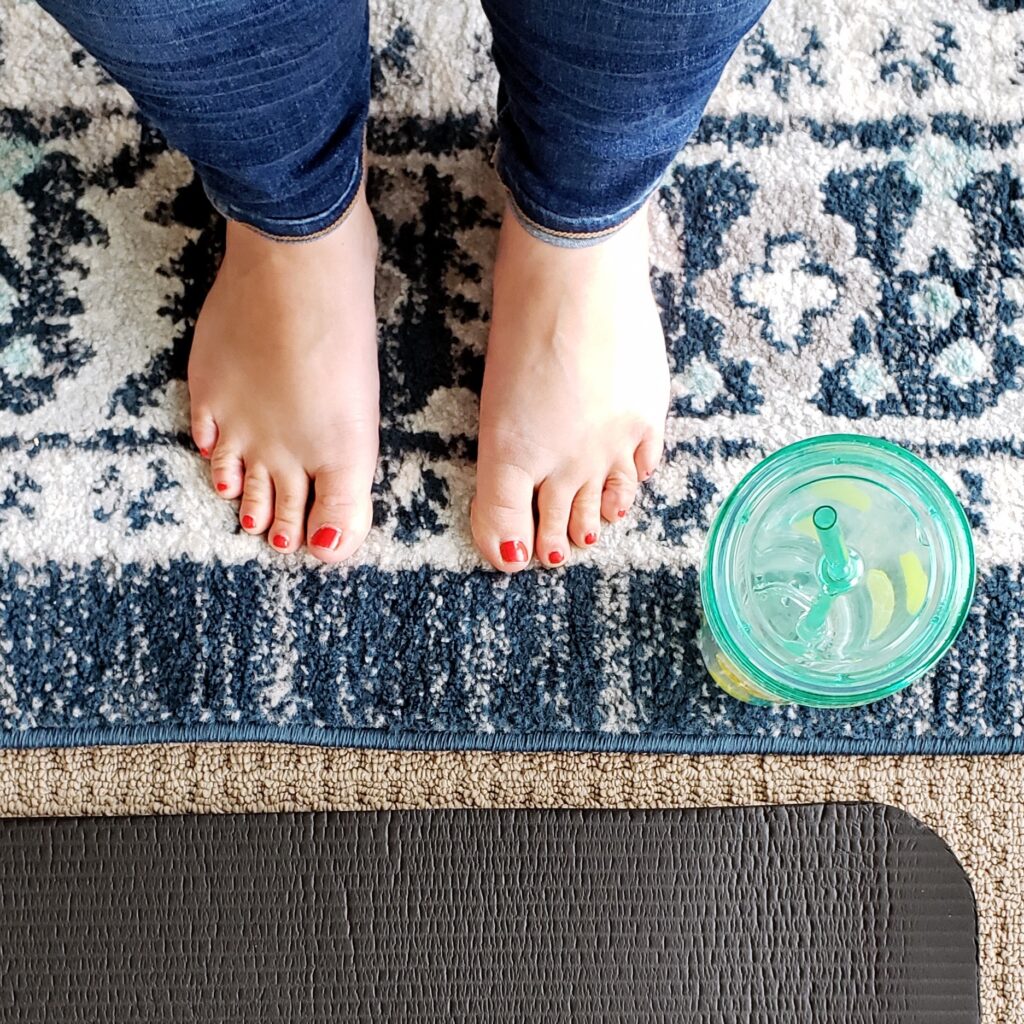
As a culture, we’ve somehow widely accepted that the epitome of a woman’s value is what she looks like.
And one of the disturbing and gross truths behind that message is that a lot of people get rich when we believe that:
When we feel good in our bodies, we live our lives. When we feel bad in our bodies, we spend money to “fix” them.
We shell out cash for:
- Makeup (to cover up, reshape, and enhance),
- Hair products (dyes, serums, deep conditioners, ,
- Skin care products (lotions and creams, jade rollers, face masks, cleansers),
- Teeth whiteners,
- Body shapers (like Spanx) and other shape-changing undergarments (like push-up bras),
- Weight loss and/or diet programs,
- Exercise programs (online or in a gym) and equipment;
- Fitness apps (for logging calories, exercise, etc.),
- Fitness trackers (like Fitbit, Apple Watch, etc.)
- And I’m sure you can think of even more things you pay for when you feel down on your looks.
Paying for these things doesn’t mean you’re bad! Please don’t waste a single second shaming yourself if you spend money on any or all of these things.
But knowing that companies in all these industries–even the ones with body-positive messaging–profit when you feel bad–can help you start to question the cultural messages that make you hate your body.
Do you feel down on your body because it’s actually bad?
Or do you think “I hate my body” after you’ve been looking at (possibly Photoshopped or distorted) images of bodies in ads and media–with text telling you your body is bad so you’ll want to buy some stuff to “fix” it?
I Feel Better in a Swimsuit at a Size 14 Than I Did at a Size 4
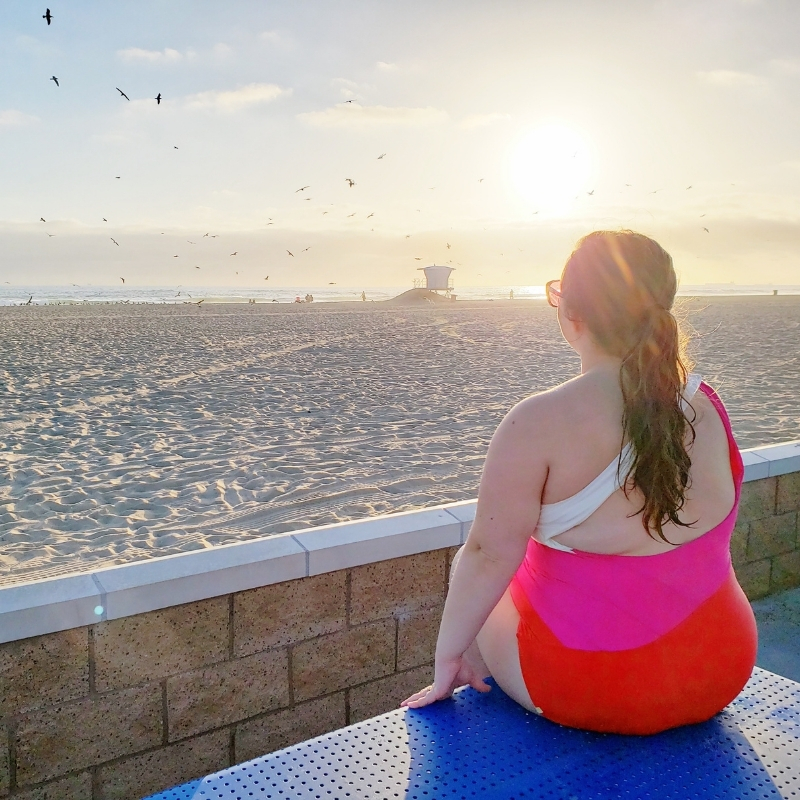
After looking at how poor body image changes our spending habits, it’s kind of no wonder we have a deeply ingrained belief that our worthiness is tied to our looks.
And it’s not easy to change a belief so intrinsically woven into our entire culture.
But here’s something weird that has happened for me since I started questioning the value of my looks in my body:
I feel better in a swimsuit at a size 14 than I did at a size 4.
Strange, right?
I still don’t feel amazing or beautiful in a swimsuit, and I admit I still body check myself a LOT. (Body checking is when you walk by a reflective surface and quickly check your appearance–and usually judge it).
I worry (a lot) about what people might think of or say about me–especially people who knew me when I was thinner.
So I don’t feel 𝘱𝘦𝘳𝘧𝘦𝘤𝘵 or carefree in a swimsuit. But I do feel happy.
And here’s why.
Do I Hate My Body?:
What I Really Wanted Out of My Looks
Honestly, I thought I needed to be thinner to feel happy in a bathing suit–even when I was a size 4.
So at first I tried to fix things from the outside in:
- I worked out (often too hard),
- I tried to eat less (even when I was hungry),
- I calorie counted and tracked my food (even though it stressed me out and distracted me from what mattered more),
- I body shamed.
And it made me miserable and discouraged and sad (even when I actually did lose weight).
Because in the deepest, most aching places of my heart, I didn’t desperately long for a pancake-flat belly or cellulite-free thighs.
I longed to know that I was accepted, appreciated, loved, and cherished–regardless of how thin, well-dressed, or put-together I was.
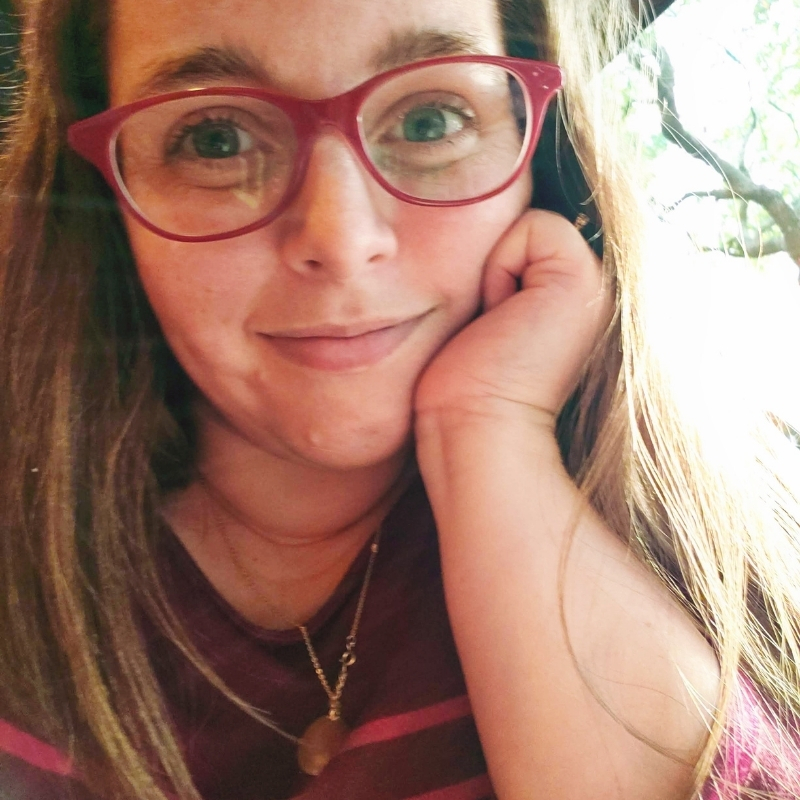
And the thing is… I was.
I was loved.
But I couldn’t comprehend it or accept it from the place I was standing–and no one else telling me so could make a difference unless I decided to believe it.
Is it okay to want to eat better, grow stronger, be healthier? Heck yes. I’m all for it.
But there’s no reason to limit your worthiness based on your body shape, your weight, your size, or your physical capacities or ability.
You are loved, you are loved, you are loved.
And anyone who loves you less because of the size or shape or capacity of your body doesn’t understand what your incredible body is really for. (And they probably feel very insecure about their own body, too.)
Your Body Is an Instrument, Not an Ornament
Lindsay and Lexie Kite, founders of Beauty Redefined and authors of the body positive book More Than a Body, created this incredible mantra:
“Your body is an instrument, not an ornament.”
And it means, quite simply, that your body’s purpose is to connect you to your world–not to be an object for the world to look at.
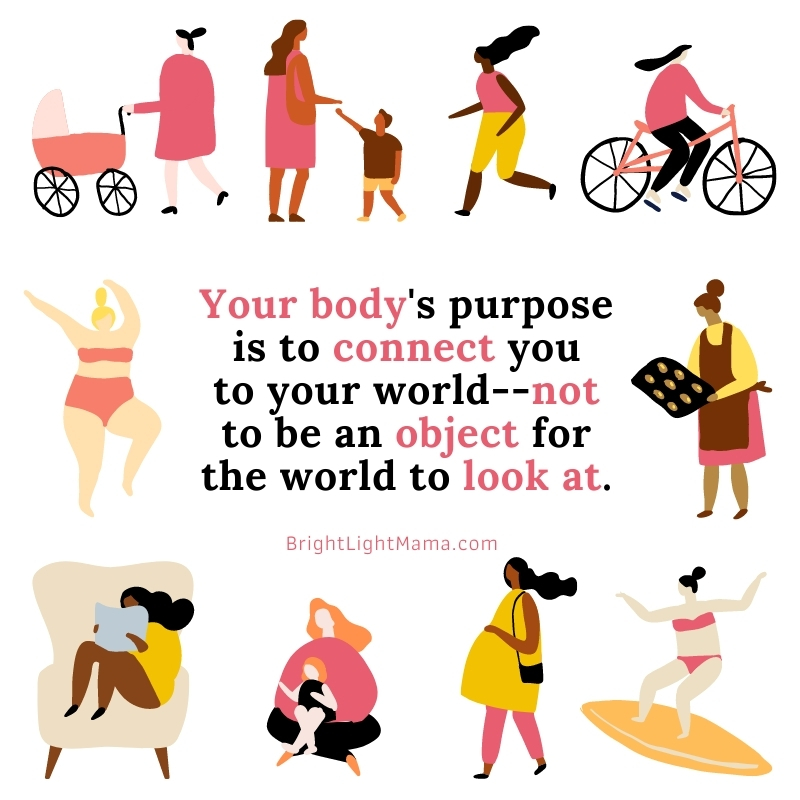
How differently do we see our bodies when we consider them as powerful tools we can use to get the most out of our lives, rather than as objects for others to admire?
When we see our bodies as tools of connection, we claim them for ourselves.
This is the state of mind I come back to, over and over, when I start to stray into thoughts about how maybe I hate my body for its looks.
I practice seeing my body’s value beyond what it looks like:
- My body lets me write to you, read books, enjoy the red ripe tang of strawberries and the sweetness of summer watermelon.
- It lets me feel the cool breeze, dig in the dirt, swim through clear blue water.
- It connects me to others through the affection and encouragement of kisses, hugs, high-fives, and cuddles.
- When I’m sick, it wages war on invading germs.
And no, it can’t always do every single thing I want it to.
But it tries its best.
Body love is complicated and challenging, and I am not there yet.
So I’m starting here: redefining what my body’s purpose is, and reminding myself again and again and again:
My body’s purpose is to connect me to my world,
not to be an object for the world to look at.
xo,
Jamie
